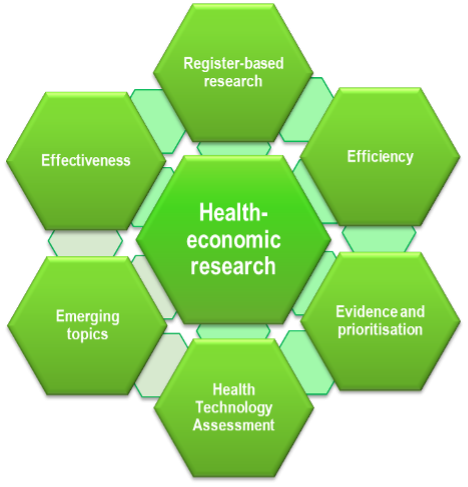Health economics typically analyses and evaluates the functioning and performance of healthcare systems and welfare from an economic perspective, often usefully using the skills and knowledge from other disciplines.
Health-economic research can have major implications for the organisation of healthcare, including its financing and the efficient and equitable allocation of resources and services. Health-economic research in the Health Sciences unit (HES) is concentrated around effectiveness and efficient allocation, in an attempt to maximise health and distribute it equitably. It does this by linking basic elements of health-economic research: costs, effectiveness and efficiency, to the evidence needs of decision-making or prioritisation processes, as depicted in the figure below.

With a focus on rigorous research, we are building on existing networks, as well as expanding our collaborations relating to the effectiveness, the cost-effectiveness and the value of healthcare. We promote the use of evidence-driven and real-world data -based approaches by working to improve understanding about effectiveness and register-based research. Closely linked to these efforts is the national and international collaboration relating to pharmaceutical policy as part of the MHSSP -team.
Our aim is to strengthen the ability of health economics to offer suitable information for healthcare and public-health decision-makers, and to strengthen the ability of such information to be produced by other groups in and around HES and Tampere University (TAU). Health economics is taught at all levels in TAU, and keen students have made health economics the topic of Master’s and PhD theses. Examples of ongoing research include:
- Benchmarking Controlled Trials (BCTs) on novel strategies for treatment of musculoskeletal pain and lower back pain (as part of collaboration with the Finnish Institute of Occupational Health and several wellbeing services counties)
- Economic evaluations alongside two large, RCTs of screening for prostate cancer in Finland (as part of the FinRSPC and ProScreen trials)
- Estimating the costs of diabetes in Finland 1993–2023 (as part of the FinDM project)
- Methodological research into, e.g., the meanings of real-world evidence and effectiveness, and assessment of the qualities of evidence (as part of both national and international collaboration)
- Patterns of Drug Prescription and Related Disease (as part of the PRIMUS project)

